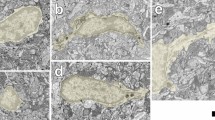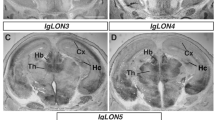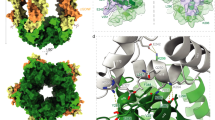Abstract
Cell-surface proteins are believed to have important roles in cell–cell interactions during brain development, particularly in such processes as cellular adhesion, neurite outgrowth and synapse formation1–4. The chick neural cell adhesion molecule, CAM, is a cell-surface protein specific to the nervous system and has been implicated in cell adhesion among cells and neurites of the developing retina and brain5–8. Previous studies have shown that F(ab′) fragments of antibodies directed against CAM inhibit the in vitro aggregation of cells obtained from 9-day embryonic chick retina. The specific antibody fragments also reduce the diameter of neurite fascicles that grow out from cultured dorsal root ganglia, apparently by blocking side-to-side adhesion between the neurites. In addition, anti-CAM antibodies alter the appearance of histotypic patterns in retinal cell aggregates maintained in culture for several days7. We now demonstrate that the antibodies can disrupt histogenesis of the developing retina in organ culture, strengthening the notion that the cell–cell adhesion properties mediated by CAM are involved in the normal development of histological layers in the chick retina.
This is a preview of subscription content, access via your institution
Access options
Subscribe to this journal
Receive 51 print issues and online access
$199.00 per year
only $3.90 per issue
Buy this article
- Purchase on Springer Link
- Instant access to full article PDF
Prices may be subject to local taxes which are calculated during checkout
Similar content being viewed by others
References
Brown, J. C. Expl Cell Res. 69, 440–442 (1971).
Santala, R., Gottlieb, D. I., Littman, D. & Glaser, L. J. biol. Chem. 252, 7625–7634 (1977).
Stallcup, W. B. Brain Res. 126, 475–486 (1977).
Mahler, H. R. in Complex Carbohydrates of Nervous Tissue (eds Margaolis, R. U. & Margolis, R. K.) 165–184 (Plenum, New York, 1979).
Brackenbury, R., Thiery, J-P., Rutishauser, U. & Edelman, G. M. J. biol. Chem. 252, 6835–6840 (1977).
Thiery, J-P., Brackenbury, R., Rutishauser, U. & Edelman, G. M. J. biol. Chem. 252, 6841–6845 (1977).
Rutishauser, U., Thiery, J-P., Brackenbury, R. & Edelman, G. M. J. Cell Biol. 79, 371–381 (1978).
Rutishauser, U., Gall, W. E. & Edelman, G. M. J. Cell Biol. 79, 382–393 (1978).
Kahn, A. J. Devl Biol. 38, 30–40 (1974).
Mishima, H. & Fujita, H. Albrecht v. Graefes Arch. Ophthal. 206, 1–16 (1978).
McLoon, S. C. & Hughes, W. F. Brain Res. 150, 398–402 (1978).
Hinds, J. W. & Hinds, P. L. J. comp. Neurol. 197, 277–300 (1978).
Heaton, M. B., Alvarez, I. M. & Crandall, J. E. Anat. Embryol. 155, 161–178 (1979).
Author information
Authors and Affiliations
Rights and permissions
About this article
Cite this article
Buskirk, D., Thiery, JP., Rutishauser, U. et al. Antibodies to a neural cell adhesion molecule disrupt histogenesis in cultured chick retinae. Nature 285, 488–489 (1980). https://doi.org/10.1038/285488a0
Received:
Accepted:
Issue Date:
DOI: https://doi.org/10.1038/285488a0
This article is cited by
-
Retinal progenitor cells release extracellular vesicles containing developmental transcription factors, microRNA and membrane proteins
Scientific Reports (2018)
-
Eye and neural defects associated with loss of GDF6
BMC Developmental Biology (2006)
-
Hamster pulmonary endocrine cells with neural cell adhesion molecule (NCAM) immunostaining
Histochemistry and Cell Biology (1995)
-
Distribution of NCAM-180 and polysialic acid in the developing tectum mesencephali of the frog Discoglossus pictus and the salamander Pleurodeles waltl
Cell and Tissue Research (1993)
-
NCAM in the organ of Corti of the developing mouse
Journal of Neurocytology (1990)
Comments
By submitting a comment you agree to abide by our Terms and Community Guidelines. If you find something abusive or that does not comply with our terms or guidelines please flag it as inappropriate.



